|
|
|
Sort Order |
|
|
|
Items / Page
|
|
|
|
|
|
|
| Srl | Item |
| 1 |
ID:
127065
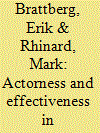

|
|
|
|
|
| Publication |
2013.
|
| Summary/Abstract |
This article examines the role of the European Union (EU) and United States as actors in international disaster relief. We take the analysis of 'actorness' one step further than normal by assessing the extent to which different aspects of EU and US actorness led to effectiveness in actual outcomes. In doing so, we make two contributions. First, we provide a rare comparison between EU and US foreign policy actorness, shedding light on the actor capability of each bloc in the area of international disaster relief. Second, we specify the relationship between actorness and effectiveness, a relationship which is too often assumed rather than explored. Using previous research of EU and US actorness as a starting point, we link four aspects of actorness to effectiveness and assess the resulting hypotheses using the case of the 2010 Haiti earthquake. We find support for our proposed links between actorness and effectiveness, although further research is needed before robust conclusions can be drawn.
|
|
|
|
|
|
|
|
|
|
|
|
|
|
|
|
| 2 |
ID:
127062
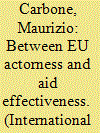

|
|
|
|
|
| Publication |
2013.
|
| Summary/Abstract |
This article argues that, by acting autonomously and cohesively, the European Union (EU) was able to shape the global agenda on foreign aid throughout the 2000s, particularly on the issue of donor complementarity and division of labour. By contrast, its ability to promote aid effectiveness in Sub-Saharan Africa was significantly constrained by national aid bureaucracies and by the complex aid architecture. More generally, to fully understand whether or not the EU is an effective actor, it is necessary to take into account how EU actorness contributes to the issue being discussed. At headquarter level, the European Commission sought to enhance EU actorness, which was seen as key to aid effectiveness. On the ground, national aid bureaucracies resisted EU actorness in the name of aid effectiveness.
|
|
|
|
|
|
|
|
|
|
|
|
|
|
|
|
| 3 |
ID:
127060
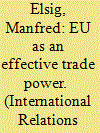

|
|
|
|
|
| Publication |
2013.
|
| Summary/Abstract |
Drawing on the European Union (EU) foreign policy literature on effectiveness, this article studies how the European Union chooses judges to serve on the World Trade Organization's key judicial institution: the Appellate Body. Conceptually, the article differentiates between effectiveness in representation and effectiveness in impact. The article shows how delegation to the European Commission has increased the strategic agenda-setting power for championing its preferred candidates. The article further compares European and US practice in nominating candidates. Overall, the article finds that effectiveness in representation has increased over time. In terms of effectiveness in impact, the article shows how the international environment conditions the EU's influence. The article also exposes the difficulties of studying the effectiveness of EU external relations due to the peculiar decision-making processes dominant in judicial bodies.
|
|
|
|
|
|
|
|
|
|
|
|
|
|
|
|
| 4 |
ID:
127017
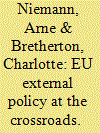

|
|
|
|
|
| Publication |
2013.
|
| Summary/Abstract |
The goal of this Special Issue is to improve our conceptualisation and empirical understanding of EU actorness and effectiveness in International Relations. While the European Union aspires to play a greater global role, its actorness and effectiveness cannot be taken for granted given the nature of the EU as a multi-level and semi-supranational polity encompassing 28 Member States with diverse foreign policy preferences. The EU is presently at an important crossroad. On the one hand, its external policy stature and capacity have been boosted by institutional innovations and by the Union's increased involvement in the full spectrum of international issues. On the other hand, a number of factors cast doubt on the EU's real external policy actorness and effectiveness: slow and often only modest internal reforms, an increasing politicisation of formally 'low politics' issues, the prolonged sovereign debt crisis in the Eurozone, and a less favourable external environment, with the US shifting its focus to the Asia-Pacific region and emerging powers creating a more polycentric world order. In view of these changes and subsequent developments in the scholarly literature, our aim is to re-evaluate earlier conceptions of EU actorness. Central to this re-evaluation will be a shift in focus from notions of actorness to effectiveness. This introductory article will unpack and further elaborate the issues raised in this abstract by delineating the EU as an international actor in the empirical context, by reviewing the existing conceptual literature, defining and conceptualizing key notions and by providing an overview of the contributions to this Special Issue.
|
|
|
|
|
|
|
|
|
|
|
|
|
|
|
|
| 5 |
ID:
127049
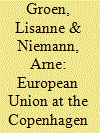

|
|
|
|
|
| Publication |
2013.
|
| Summary/Abstract |
This article analyses the extent of European Union (EU) actorness and effectiveness at the 15th United Nations Framework Convention on Climate Change (UNFCCC) Conference of the Parties (COP) meeting in Copenhagen in December 2009. Although the EU has been characterised as a leader in international climate policy-making for some time, the COP 15 meeting in Copenhagen has overall brought about disappointing outcomes for the Union. This casts doubts on EU actorness and effectiveness in this field. We take the article by Jupille and Caporaso as a conceptual point of departure and then specify a more parsimonious actorness framework that consists of coherence and autonomy. Effectiveness is conceptualised as the result of actorness conditioned by the 'opportunity structure', that is, the external context that enables or constrains EU actions. We hold that EU actorness was only moderate, especially given somewhat limited coherence. In terms of the opportunity structure, we argue that the strong involvement of other important actors with rather different positions adversely impacted on EU effectiveness, along with a high degree of politicisation that constrained the European Union's ability to negotiate effectively.
|
|
|
|
|
|
|
|
|
|
|
|
|
|
|
|
| 6 |
ID:
127018
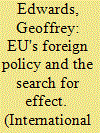

|
|
|
|
|
| Publication |
2013.
|
| Summary/Abstract |
The Lisbon Treaty sought to meet new global challenges by providing the European Union (EU) with stronger institutional capacity and policy instruments to make it a more effective international actor in foreign and security terms. The article sets out the structures and practices agreed and contested by both Member States - especially the United Kingdom and France - and the European Commission, focusing on the roles of the High Representative (HR) for Foreign Affairs and the European External Action Service. It points to the disjuncture between the formal calls for greater coherence and consequence in the EU's foreign policies, the problems of creating an effective policy vehicle and the practices that undermine both its efforts and its legitimacy.
|
|
|
|
|
|
|
|
|
|
|
|
|
|
|
|
| 7 |
ID:
127019


|
|
|
|
|
| Publication |
2013.
|
| Summary/Abstract |
This article relates the effectiveness of the European Union's (EU) effectiveness to its international actorness in negotiations on international food standards taking place in the Codex Alimentarius Commission (CAC). Actorness is taken to result from EU competence, preference homogeneity and processes of socialisation among EU Member State representatives. In the 2009 negotiations on growth promoters for livestock, whose use the EU opposes, the Commission took the lead. It was trusted and supported by the EU Member States, but its dominant role resulted in them being rather passive. As a result, the EU's potential to negotiate effectively in the CAC was not used in its full potential.
|
|
|
|
|
|
|
|
|
|
|
|
|
|
|
|
| 8 |
ID:
127069
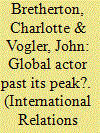

|
|
|
|
|
| Publication |
2013.
|
| Summary/Abstract |
Examining a range of policy areas in which the European Union (EU) acts externally - notably trade, development, climate change and foreign and security policy - this article considers the notion that the years since the mid-2000s have witnessed a decline in EU actorness/effectiveness. In evaluating EU performance, the article employs the interrelated concepts of presence, denoting EU status and influence; opportunity, denoting the external context of EU action; and capability, referring to EU policy processes and instruments, with particular reference to the impact of the 2009 Lisbon Treaty. It is contended that achievement of the increased capability envisaged by the Lisbon Treaty, together with resolution of the Eurozone crisis, with its deleterious effect upon the Union's presence, would not fully compensate for the loss of opportunity provided by the changing international structure.
|
|
|
|
|
|
|
|
|
|
|
|
|
|
|
|
|
|
|
|
|